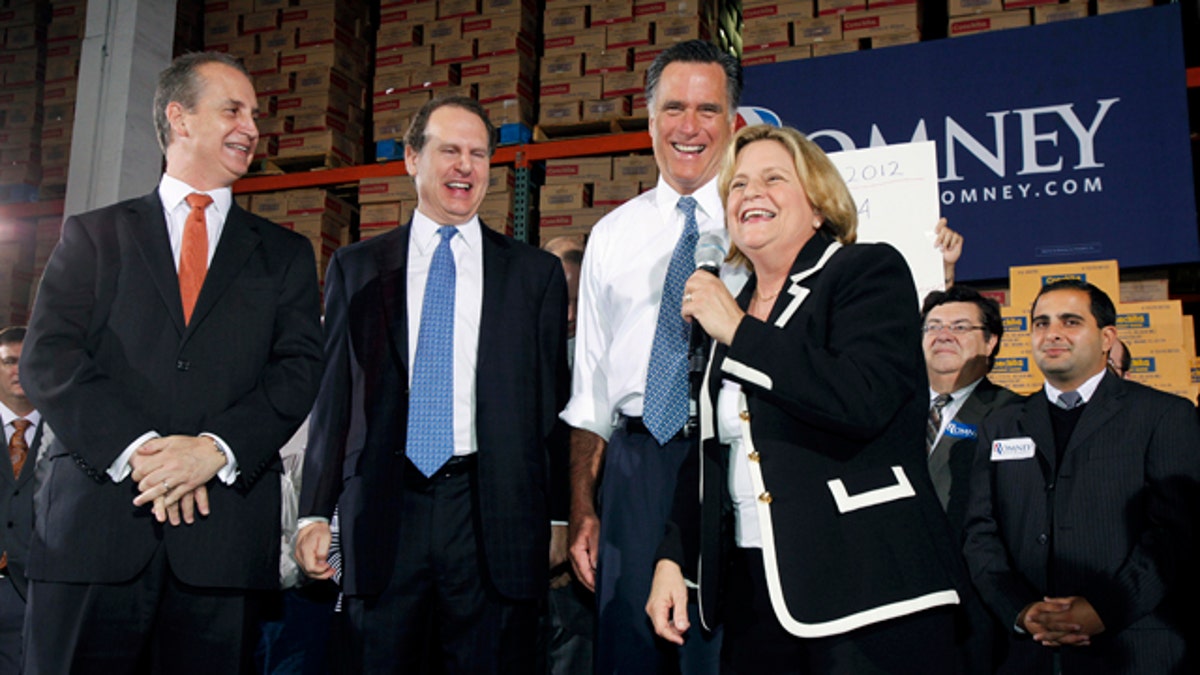
Mitt Romney shares the stage in November with influential Hispanic Republicans in Florida, Rep. Mario Diaz-Balart, former Florida Rep. Lincoln Diaz-Balart and Rep. Ileana Ros-Lehtinen. They helped the Republican presidential candidate secure a Florida victory. (AP)
As the Republican candidates focus this week on Florida and its primary on Tuesday, the issue of Cuba is taking center stage.
Both Mitt Romney and Newt Gingrich have scheduled major events specifically to talk about the communist dictatorship 90 miles south of Key West. They plan to discuss what they would do with the Castros as president, among other topics.
In doing so, they hope to court the substantial number of Cuban-Americans who are now U.S. citizens, 70 percent of whom vote Republican.
"The people of Cuba deserve freedom," said Newt Gingrich to an auditorium of applause at an event this week.
Gingrich came to the Florida International University campus on Wednesday to deliver a policy speech on Latin America. He and the other candidates know very well that the 600,000 Cuban Americans in Florida make up 12 percent of the electorate.
Gingrich promises as president he would "isolate, destabilize and terminate the Castro dictatorship."
Also on Wednesday, the US-CUBA Democracy PAC welcomed Mitt Romney in downtown Miami at the historic Freedom Tower. It's a legendary place in Cuban culture, where new Cubans arriving in the 1960s on Freedom Flights out of Havana would come for powdered eggs, milk and direction in their new homeland.
On hand for Romney, long-time Cuban-American lawmakers Ileana Ros-Lehtinen, Mario Diaz-Balart and Lincoln Diaz-Balart. All three pro-embargo Republicans endorse Romney for president.
Dario Moreno, a political science professor at F.I.U, says so far Gingrich is courting the Cubans most effectively.
"I think the only candidate that has really used the old-style, anti-Castro rhetoric has been Gingrich. He talked about a 'Cuban Spring.' He has attack ads against Romney, for not having talked much about Cuba," says Moreno.
Of the four candidates, Romney, Gingrich and Rick Santorum all favor keeping the U.S. embargo on Cuba in place, as Santorum said, "until the Castros are dead."
Ron Paul takes the complete opposite position. As he said in Monday night's debate in Tampa, he thinks anyone who supports strangling the Cuban people with the embargo is living in the Dark Ages.
"I would do pretty much the opposite. I don't like the isolationism of not talking to people. I was drafted in 1962 at the height of the Cold War when the missiles were in Cuba. And the Cold War's over," said Paul.
Moreno doesn't think Cuban policy as a whole matters as much this year to the Cuban-American voter. He thinks they care about the same things most Americans care about this election year:
"I think they care more about the economy and jobs," said Moreno.
Historically, the Cuban bloc votes for whichever Republican candidate is ahead on the day before the election, going back with McCain, Bush, Bush and Dole. But in this neck-and-neck race in Florida right now, nothing is assured.




